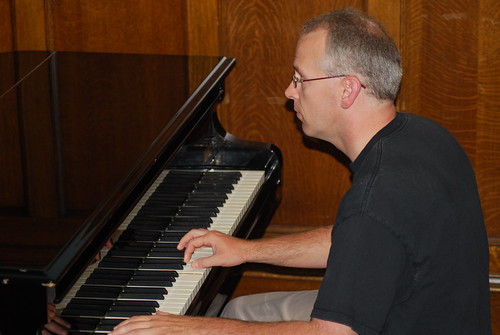JISC Open
Are the wheels coming off the open education juggernaut?
- Session notes for Innovating e-Learning 2009 Online Conference by Brian Lamb
- Session description: There is plenty of good will and exciting activity associated with open education. Openness is increasingly seen as a desirable practice, even a "best practice", and promising new projects keep appearing. Then again, there are troubling signs that the business models for many open education projects are problematic and vulnerable. And for all the increases in the supply of open educational resources, there remain thorny questions on the demand side, we can point to little evidence of significant reuse. And while open education is increasingly spoken of as a movement, like all such movements there are significant divisions amongst its most passionate proponents concerning the vision and the application of open education. Is open education already in crisis? Or are these ordinary growing pains on the way to achieving enduring change? This session will consider these questions through multiple voices, including many drawn from last summer’s Open Education Conference in Vancouver, Canada.
Part one: promise and peril, with Catherine Ngugi
Listen to Part One.
Catherine Ngugi is the Project Director of OER Africa. She gave the opening keynote at the 2009 Open Education Conference in Vancouver, Canada. (Video of keynote.)
The discussion with her in part one of this session was also recorded in Vancouver, interview and production by Frieda Werden. This is an edited excerpt, the full interview can be found at Women's International Newsgathering Service (http://wings.org) program #16-09, "Open Education for Africa".
Backing music for this section is "Pops" by Jonathan Kane's February.
Part two: open platforms, the culture of openness
First interview, Jim Groom: http://bavatuesdays.com
Listen to Part Two.
- Open Courses: Free, but Oh, So Costly, The Chronicle of Higher Education
- There is a difference between publishing open courseware and being open: "The key to understanding the value of open education is that most of the benefits accrue to the sharer, not the recipient."
- "Facilitate and support course design where student project work is published to the Web." Also: Text Technologies
- "The option to make "public to the world" should be as easy as flipping a switch." Better yet, choose a default open platform such as this.
Or, to take the example of...
- The Chronicle of Higher Education is interested in Jim Groom when he is arguing about Edupunk, not so much when he is pulling off miracles of economy like cloning full-featured publishing platforms in a couple hours.
Note: 'that guy' Brian and Jim are referring to in their little jokes about cults and Canadians is Minhaaj Rehman, who has some very strong words about the implicit imperialism he suggests is embedded in the open education model.
Second interview, David Wiley: http://opencontent.org/blog/
On sharing:
- Scott Leslie Planning to Share versus Just Sharing
- Martin Weller, The cost of sharing, The reciprocity economy
- McGill, L and Currier, S and Duncan, C and Douglas, P (2008) Good intentions: improving the evidence base in support of sharing learning materials.
- The Future of OCW, and “OCW 2.0″: "A new generation of OpenCourseWare projects are built around sustainability plans. These second generation projects are integrated with distance education offerings, where the public can use and reuse course materials for free (just like first generation OCWs) with the added option of paying to take the courses online for credit (there is no way to earn credit from the first generation OCWs)."
Backing music for this section is mr&mrsBrian, Phase I and Phase II




